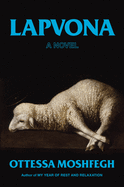
Good news for fans of cannibalism and other grotesqueries: Ottessa Moshfegh (Death on Her Hands; My Year of Rest and Relaxation) serves up a smorgasbord of medieval ugliness in Lapvona. The equally good news is that this is a well-constructed and thoughtful novel that makes timely comments about inequality and despair.
Marek, a religious 13-year-old shepherd boy who "had grown crookedly," lives in squalor with Jude, his brutal father, who hits him hard enough to knock out his teeth and laments the absence of his wife, Agata, who he says died in childbirth. The only person to show kindness to Marek is Ina, the village wet nurse with encyclopedic "knowledge of medicinal plants" and "whose breasts had fed half the population." The villagers' poverty exists in sharp contrast to the life of Villiam, Lapvona's "lord and governor," a ruler so pampered that when he chokes on his sumptuous feast, he summons a servant to slap him on the back. Even his privileged and silk-clad 14-year-old son, Jacob, hates the guy.
These two worlds collide in beautifully rendered scenes that challenge Marek's devotion and--be warned--involve creative forms of violence and degradation. Lapvona may not be for all stomachs, but one of its pleasures is that, like many good novels, it takes narrative turns that will surprise and unmoor readers. This isn't a hopeful story, but readers will come away thinking that, if one squints hard enough, one can sometimes see pinpoints of light in the darkest times. And that's good news. --Michael Magras, freelance book reviewer

